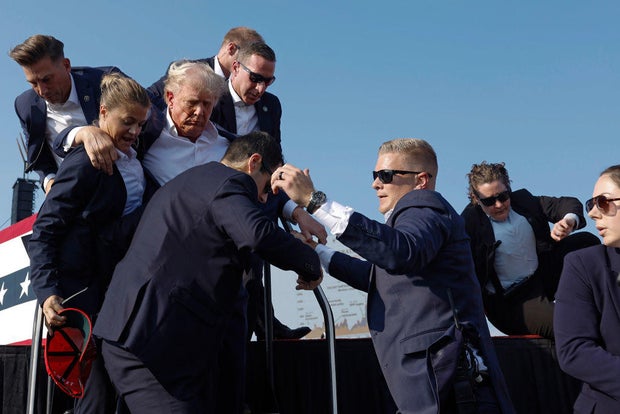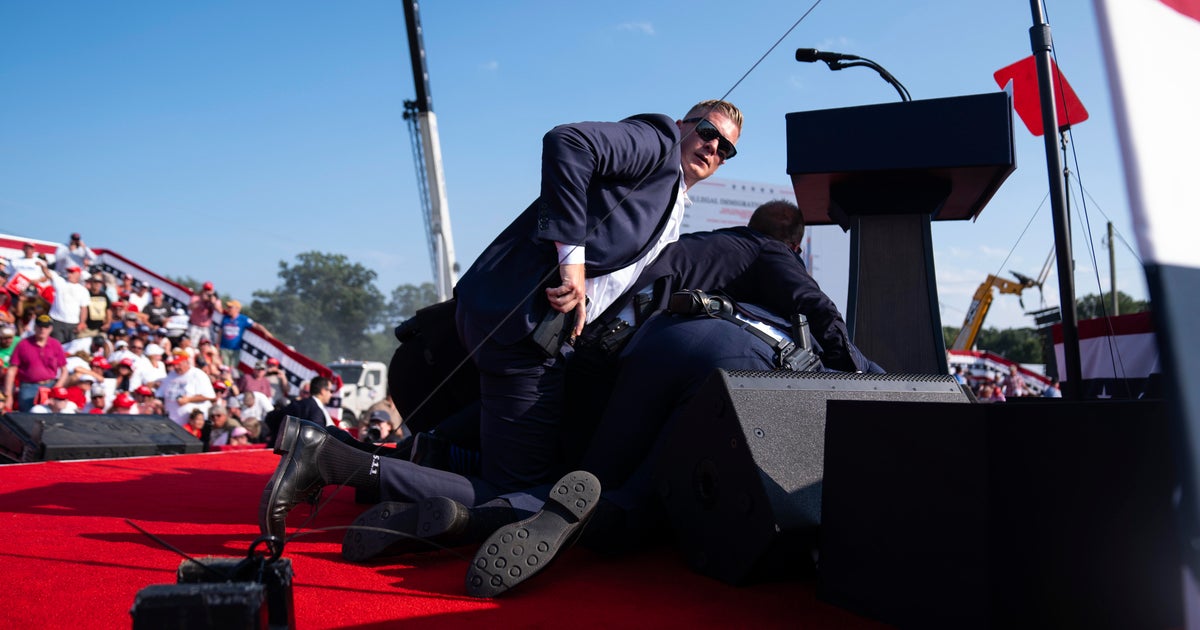/ CBS News
Historian on past U.S. assassination attempts
A shooting at a Pennsylvania rally on Saturday that injured former President Donald Trump has heightened concerns about political violence and increased awareness of past attacks and assassination attempts against presidents and candidates.
In a social media post shared on Saturday night, Trump thanked law enforcement officials for their quick actions after he was "shot with a bullet that pierced the upper part of my right ear."
The Butler County district attorney confirms to CBS Pittsburgh station KDKA that two people are dead — the gunman and an audience member. Two law enforcement sources told CBS News the gunman was killed by a Secret Service sniper. Two other attendees are in critical condition.
Reporters heard numerous shots and Secret Service rushed the stage. Video captured by CBS News shows Trump touching his ear and then crouching to the ground. Some blood could be seen on his face.

Past direct attacks against presidents and candidates
Direct assaults against presidents, presidents-elect, and candidates have occurred on 15 separate occasions, with five resulting in death, according to a 2008 report compiled by the Congressional Research Service. Of the 45 individuals serving as president, 13 (or about 29%) have been subject to actual or attempted assassinations. That number does not include the latest incident involving Trump.
At least seven of the past nine Presidents have been targets of assaults, attacks or assassination attempts. The Congressional Research Service report says presidents who survived attacks include Gerald R. Ford (twice in 1975), Ronald W. Reagan (a near-fatal shooting in 1981), Bill Clinton (when the White House was fired upon in 1994), and George W. Bush (when an attacker threw a grenade that did not explode towards him and the president of Georgia during an event in Tbilisi in 2005), and the latest Congressional Research Service report, citing Secret Service as source, says also that there have been attempts on former President Barack Obama, Trump and President Biden.
Two others who served as President were attacked, either as a President-elect (Franklin D. Roosevelt in 1933) or as a presidential candidate (Theodore Roosevelt in 1912, when he was seeking the presidency after being out of office for nearly four years).
Two other presidential candidates —Robert F. Kennedy, who was killed in 1968, and George C. Wallace, who was seriously wounded in 1972— were also victims of direct assaults, according to the report compiled by the Congressional Research Service.
Presidents who were assassinated
Four presidents — Abraham Lincoln, James A. Garfield, William McKinley and John F. Kennedy — have been assassinated.
Of the 15 attacks listed in the report, only the Lincoln assassination was the result of a broad conspiracy, the report says. But conspiracy theories still surround many of these events.
In only one incident — the Lincoln assassination — was a broad conspiracy proven, although such contentions have arisen on other occasions. Only one other incident involved more than one participant — the 1950 assault on Blair House, the temporary residence of President Harry S Truman. But no evidence of other conspirators emerged from the subsequent investigation or prosecution.
Of the 18 attacks or assassination attempts on presidents or presidential candidates, all but two involved firearms. All but two of the attacks, both against Ford, were committed by men. All but one of the 15 assaults occurred within the U.S.
First documented attack against a president
According to the Congressional Research Service, the first attack occurred in 1835, when an attacker's pistol misfired against President Andrew Jackson. The attacker, Richard Lawrence, was declared insane. He said "Jackson was preventing him from obtaining large sums of money and was ruining the country," the report says.
Source: Congressional Research Service, 2008 and 2024
— Jake Miller and John Kelly contributed reporting.
Elias Lopez is a senior editor at CBSNews.com. He covers a variety of news events and works with reporters on developing stories in politics, international news and more.
